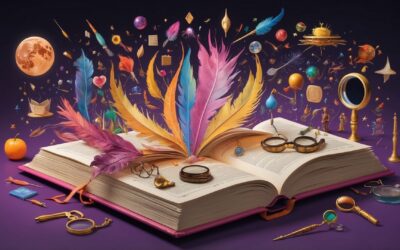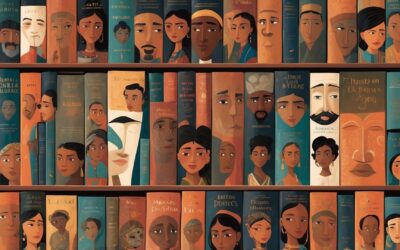Once upon a more recent time, in a world separated by boundaries, cultures, and epochs, there was a thread that connected humanity – a kind of magic, if you will. It was the magic of universal stories. Literature, with its vast expanse of narratives and tales, has consistently offered us stories that, no matter where or when they originate, resonate with readers everywhere.
The Magic of Universal Themes
Every culture has its folklore, its epics, and its literary giants. But some narratives possess a unique quality: universality. These are the stories that, whether told in the bustling streets of New York or the quiet villages of Kenya, evoke the same emotions, thoughts, and reflections.
What makes certain tales touch the hearts of a teenager in Japan and a grandfather in Brazil? Is it the plot? Not necessarily. More often, it is the themes – love, betrayal, friendship, ambition, hope, despair – these are emotions and experiences that all of humanity shares.
Timeless Tales and Characters
Consider Romeo and Juliet, the ill-fated lovers of Verona. Their story, penned by Shakespeare in the 16th century, continues to be retold and adapted across different mediums and cultures. Why? Because their love, obstacles, and ultimate tragedy are universally understandable.
Similarly, the ambitious Macbeth, the loyal Samwise Gamgee, or the curious Alice, characters from different eras and genres, are adored worldwide. Their feelings, desires, and journeys strike a chord, proving that humanity’s core emotions have remained consistent over time and across borders.
The Global Lens
Some stories, although rooted in specific cultural or geographical settings, manage to shed light on universal truths. For instance, Gabriel Garcia Marquez’s “One Hundred Years of Solitude” paints a detailed picture of life in Macondo, a town in Colombia, yet readers globally resonate with its tales of love, solitude, and fate.
Similarly, Haruki Murakami’s novels, deeply embedded in Japanese culture, touch upon loneliness, love, and existential crises – themes prevalent in every corner of the world. These narratives offer a dual experience: a journey into an unfamiliar world and a mirror reflecting one’s emotions and conflicts.
The Power of Emotion
The universality of stories often dwells in the emotional realm. Take, for instance, the concept of a hero’s journey. From King Arthur to Frodo Baggins to Mulan, the journey of a hero, their trials, tribulations, and eventual triumph, is a universally beloved plotline.
Fear, happiness, anticipation, sorrow; these emotions, complex yet innate, are what make certain tales relatable to everyone. When Santiago, in Paulo Coelho’s “The Alchemist”, embarks on a quest to find his personal legend, readers worldwide nod in understanding. Everyone has dreams and everyone faces obstacles in achieving them.
The Impact of Translations
Translations play a pivotal role in making literature universal. It’s a delicate art – ensuring that the essence, tone, and nuances of the original are maintained in another language. Translated literature provides a gateway, allowing readers to embark on journeys into cultures, eras, and worlds different from their own, all the while finding familiar feelings and messages.
Embracing Universality in Modern Times
In today’s globalized world, universality in literature is more crucial than ever. Stories have the power to unite, to highlight the shared human experience amidst our diverse backgrounds. With the advent of digital platforms, tales from every corner of the world are now accessible, emphasizing that while our lives may be different, our hearts and souls are not.
Modern authors, aware of their global audience, often embed universal themes in their tales, making them relevant for everyone, everywhere. Such literature fosters empathy, understanding, and connection.
Conclusion
In a world divided by numerous parameters, literature stands as a unifying force. Universality in tales, characters, emotions, and themes demonstrates the shared essence of humanity. It’s a heartening reminder that while our stories might be different, at heart, we are all the same. From ancient epics to modern novels, the magic of universality will always allow literature to transcend boundaries and time. It’s a magic we all need, now more than ever.
Keywords
- Universality: The quality of being universally applicable or understandable.
- Epochs: A particular period of time in history or a person’s life.
- Resonate: Produce or be filled with a deep, full, reverberating sound, often used metaphorically to indicate when an idea or theme has a profound impact on a person.
- Ill-fated: Destined to fail or have bad luck.
- Existential crises: A moment at which an individual questions the very foundations of their life.
- Nuances: A subtle difference in or shade of meaning, expression, or sound.
- Translated literature: Literary works that have been translated from one language into another.
- Personal legend: A term from “The Alchemist” which refers to an individual’s destined path or purpose in life.
- Globalized: When businesses and other organizations develop international influence or start operating on an international scale.
- Empathy: The ability to understand and share the feelings of another.
Key Takeaways
- Universal themes in literature touch upon emotions and experiences shared by humanity, making them relatable across cultures and times.
- Characters like Romeo, Juliet, and Macbeth from different eras resonate universally because of their relatable emotions and journeys.
- Stories rooted in specific cultural settings can still have universal appeal due to shared human experiences and emotions.
- The hero’s journey, represented by characters from different cultures, is a universally beloved plotline because it speaks to trials, tribulations, and triumphs.
- Translated literature helps in making a story universal, allowing readers from different linguistic backgrounds to relate to it.
- In today’s interconnected world, universal themes in literature are more important than ever, fostering a shared human experience.
- The universality in stories showcases the shared essence of humanity, proving that regardless of cultural or historical differences, at heart, humans share similar feelings, dreams, and fears.
Check out the Story of Literature Article Series
The Story of Literature: Delving into Humanity’s Timeless Narratives (Featured Article)
From Campfire Tales to Digital Screens: The Evolution of Storytelling
Drama through Time: From Ancient Shadows to Modern Stages
The Mesmerizing Power of Novels: A Deep Dive into Our Fascination with Long Narratives
Echoes of Society: The Deep Interplay between Literature and Cultural Values
Navigating the Digital Revolution: How Literature Evolves in a Tech-driven World
Universality in Literature: Uniting Hearts and Minds Across Cultures










0 Comments